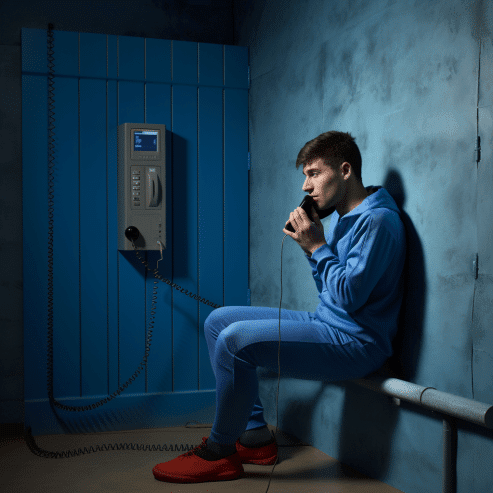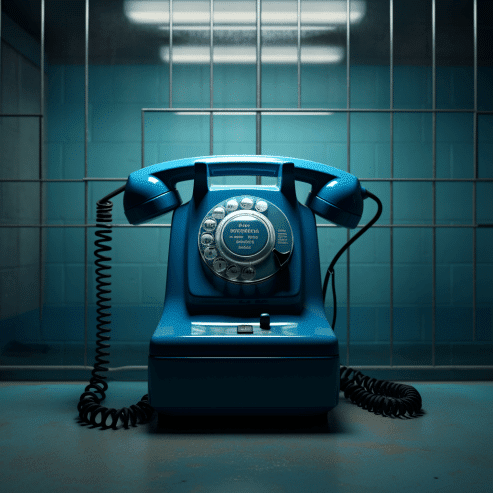Do UK prisoners have phones?
Do UK Prisoners Have Phones?
Phone Calls in Prison
UK prisons are equipped with telephones that allow inmates to maintain communication with their families and friends. However, these telephones are subjected to certain usage constraints. For instance, there are stipulated times during the day when prisoners are allowed to make calls. Moreover, due to the limited number of phones—often one or two per wing—prisoners might have to wait in line or even book an appointment to get access to a phone.
Do UK Prisoners Have Phones?
Paying for Calls
The financial responsibility for phone calls lies with the prisoners. They fund their calls using their own money or the earnings they accumulate during incarceration. For those wanting to assist inmates with phone call expenses, the preferred method is to send money via a postal order. Further details can be obtained under ‘Property and Money’.
Who Can Inmates Call?
Upon entering prison, each inmate receives a unique PIN number and a form. This form is for listing up to twenty personal contacts and fifteen legal contacts they wish to communicate with during their imprisonment. After providing the necessary details like name, address, and phone number for each contact, the provided list goes through a security check. Once approved, the prisoner can only call the numbers linked with their PIN.
There are exceptions: certain numbers, such as those of victims or media outlets, can be off-limits to inmates. Additionally, incoming calls from the outside world are not permitted in prisons.

Provisions for New Arrivals
New inmates should ideally be given a chance to make a call upon their arrival, informing their loved ones of their whereabouts. However, due to late arrivals or extended reception procedures, there can be delays. The process of registering a new inmate can span anywhere from 72 hours to a full week. Consequently, they might not be immediately able to call, especially if they haven’t memorized their phone numbers or have funds in their account. Moreover, the prison’s PIN system for phones might take a few days to activate, further delaying contact.
Emergency Calls
In urgent situations, if a prisoner can’t access a phone, they might be granted permission by the Governor to use an official phone line. If someone needs to convey pressing news to an inmate—like the passing of a family member—the Prison Chaplains typically play a role in delivering the message and providing necessary emotional support.
In the UK, prisoners are provided with basic necessities, but they also have the option to purchase additional items using their personal funds. The prison’s canteen or shop is the primary place where prisoners can buy these items. Here’s a breakdown of what UK prisoners commonly spend their money on:

Monitoring of Calls
It’s not uncommon for prison authorities to monitor calls, albeit selectively. While random checks are performed, most calls aren’t systematically screened. Exceptions include high-risk Category A prisoners, whose calls are regularly monitored. Calls get immediately terminated if they include content related to:
- Escape plots or other security threats.
- Criminal offenses or breaches of prison rules.
- Threats to national safety.
- Any form of threats, blackmail, racial slurs, or obscenities.
However, calls made to certain confidential entities, like the Samaritans, legal advisors, and a select few other organizations, remain private and aren’t monitored.
Voicemail System for Prisoners
The Prison Voicemail system is a modern facility offered in many prisons, allowing inmates and their families to exchange voice messages. After registering online, families receive a unique landline number. Both they and the inmate can call this number: families to leave messages and inmates to listen and reply. The Prison Voicemail app, available for Android and iOS, notifies families when the inmate accesses the voicemail system. It also allows for direct calls, high-quality messaging, and message replay. Costs for this service can vary, with rates ranging between 20p to 5p per minute. For more, you can visit their official website or contact them directly.
Writing to Inmates
Yes, inmates can receive letters. Generally, there’s no cap on the volume of letters an inmate can get. It’s essential to understand that prison authorities might inspect these letters. Exemptions include mail from legal representatives or the courts. However, if any suspicion arises, even these could be checked. If you believe your letters are being unfairly scrutinized or not delivered, you can lodge a complaint. High-security establishments might thoroughly examine both incoming and outgoing mail.
All letters must adhere to specific guidelines, ensuring they don’t contain content related to:
- Escape plots or security threats.
- Criminal activities or prison rule breaches.
- National security threats or coded messages.
- Threats, blackmail, racial offenses, or obscenities.
Non-compliant letters will be intercepted.
As for sending mail, prisoners are entitled to one free letter weekly. If they wish to send more, they can buy stamps and envelopes from the prison store. Another option is sending them pre-addressed and stamped envelopes for replies. Remand prisoners get a quota of two free letters per week.
Prisoners’ Right to Phone Communication In prison, the right to communicate with the outside world via telephone is not as straightforward as it might seem. Prisoners are limited to contacting only those individuals they’ve specifically listed as friends or family. This list undergoes stringent security checks each time a new person is added. The process involves background assessments and relationship verification to ensure that the communication is safe and serves a legitimate purpose.
Furthermore, the prison administration reserves the right to monitor and record the majority of phone conversations. There are specific exceptions, especially when calls concern sensitive legal or medical information. If the intended recipient isn’t available to answer the call, the inmate can leave a message through the prison voicemail system, which is also subject to surveillance.
The Issue of Mobile Phones in Prison With technology advancing at a rapid pace, the widespread use of mobile phones has become a societal norm. However, the world within prison walls remains vastly different. Mobile phones are among the top items banned for inmates.
The illicit use and smuggling of mobile phones into prisons have become a mounting concern for authorities. In fact, there was a marked 15% surge in the number of confiscated phones between 2017 and 2018. It’s important to note that providing an inmate with a concealed mobile phone is a criminal act, but this hasn’t deterred the rampant smuggling.
Legalities Surrounding Electronic Devices in Prisons According to Section 40D of the Prison Act 1952, unauthorized transmission of images or sounds from within a prison is deemed illegal. Moreover, Section 40D(3A) categorically states that possessing a device capable of such electronic communication without permission inside prison premises is a punishable offence.
Acknowledging the significance of maintaining ties with loved ones outside prison, the Ministry of Justice in England and Wales took the initiative to introduce in-cell phones in 20 prisons in mid-2018. The program expanded to 30 more prisons by the end of 2019. By facilitating legal communication channels, the objective is to decrease the demand for illegal phones. Additionally, these phones provide inmates better access to mental health resources and support services, aiming to reduce mental health issues prevalent among the incarcerated.
Potential Risks of Mobile Phone Usage in Prison Although well-intentioned, sneaking a mobile phone to a prison inmate can have dire consequences. Not only does it expose you to legal action, but it can also prolong the inmate’s sentence and complicate their rehabilitation process. Even unintentional contact with an inmate’s illegal phone might result in criminal charges.
Adhering to prison regulations is paramount. Ensuring that an inmate has sufficient funds in their account facilitates legal phone communication.
Guidance for Solicitors For legal professionals, it’s crucial to avoid phone communication with an incarcerated client via a mobile phone. It’s equally important to guide your staff accordingly. If you suspect that a client is calling from prison using a prohibited device, the best course of action is to terminate the call immediately, emphasizing the legal implications. Consider reminding clients that continued illegal communication may lead to termination of your legal services, as it puts you in a precarious legal situation.




